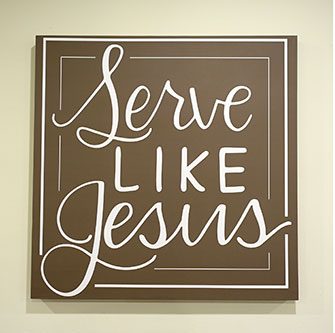34 My meat is to do the will of him that sent me, and to finish his work. 35 Say not ye, There are yet four months, and then cometh harvest? behold, I say unto you, Lift up your eyes, and look on the fields; for they are white already to harvest. John 4:34-35 KJV
Over the past two weeks we have talked about “Serving Like Jesus,” and “Loving Like Jesus.” This morning we are going to talk about “Living Like Jesus.” When I say that we are to serve, love, and live like Jesus, I am not suggesting that we can be all he was and is.
In an ultimate sense, we can never be like Jesus.. Jesus is the ultimate revelation of God and the ultimate revelation of God’s love for humankind. No name in the annals of time and eternity ever has been, or ever will be, more worthy of proclamation, honor, devotion, and praise.
In an ultimate sense, we can never be like Jesus. Yet, there is a penultimate sense in which we can be like Jesus. Let me make what I hope is a helpful and appropriate analogy.
An adult Blue Whale is the largest animal in the world today, and perhaps the largest that ever existed on this planet, one third larger than the largest dinosaur. That upset my grandson! A mature adult Blue Whale can weigh 420,000 pounds. By contrast the Blue Whale calf weighs just 5,000 pounds. A Blue Whale Calf is like an adult Blue Whale, but it falls far short of its parents in power and grandeur. Likewise, Jesus is the Only Begotten Son of God, the Eternal Word made flesh. Like him, we are “the children of God,” though we fall far short of Jesus in power and grandeur.
Now some will doubt that we are “the children of God.” We need not! In 1st John 3:1 we read, “See what love the Father has given us, that we should be called children of God, and so we are.” And in 1st John 3:2 we read, “Beloved, we are God’s children now; it does not yet appear what we shall be, but we know that when he appears we shall be like him.” Or, as St. Paul says in Romans 8:29, those whom God foreknew God “…predestined to be conformed to the image of His son.”
Our conformation to Christ, our transformation, is a two stage process. Both steps in the process are concerned with righteousness, by which we mean the ability to fulfill the demands of our relationships with God, with ourselves, and with one another.
In the first stage, God declares us righteous. Before we come to Christ, we are dressed in sin and shame. Isaiah says that all our righteousness is as filthy rags. (Isaiah 64:6) When God looks at us, we do not look so good. Then by faith we come to Christ, and God looks at us and sees not our filthy rags, but the pure, clean righteousness of Jesus Christ. This is what the old African-American spiritual means when it declares, “All God’s children got a robe.” This is what Count Zinzendorf, the patron of the renewed Moravian Church, was getting at when he wrote:
The Savior’s blood and righteousness,
My beauty is my glorious dress
Thus well arrayed I need not fear;
When in His presence I appear.
First God declares us righteous, then God makes us righteous. God adopts us into his family, and imparts to us the righteousness and character Jesus Christ. Some will ask, “How is this possible?” It is possible because of the Holy Spirit. In the New Testament the Holy Spirit is also known as: the Spirit of God, the Counselor, the Comforter, the Spirit of Christ, the Spirit of Adoption, and the Spirit of Sonship. This list is not complete. The important thing is that the Holy Spirit transforms us by his power. According to Acts 1:8, just before Jesus ascended to the Father, he told his disciples that they would receive power when the Holy Spirit had come upon them.
Now what form does that power take? Well, There are three things you should know about power.
First, power accomplishes work. The Greek word the book of Acts uses for “power” is “dunamis.” It is the same word from which we get our English word for “dynamite.” Horsepower drives a car at 100 miles an hour. Water power provides electricity, and electricity powers the world. James S. Stewart spoke of the Spirit’s awesome power in us saying we must remember that, “…the same power that took Jesus out of the grave is available to us today, not just in the moment of death, but in the midst of life.”
Second, there is plenty of power to go around. Pulitzer Prize winning author James McGregor Burns says that power is an expansive force, the more you give away, the more you have. People who have achieved true greatness understand this, people who set out to be great according to their own standards never do.
Third, there are two kinds of power. Harvard Professor and former Asst. Secretary of Defense Joseph S. Nye, Jr. says that power can be divided between hard power and soft power. Hard Power is the President of the United States ordering a strike against a terrorists’ camp, inspiring fear in the hearts of the terrorists and respect among the nations. Soft Power is Pope Francis kissing the cheek of an autistic child, inspiring love and devotion in the hearts of people, and hope among the nations. Nye says that any president, political, business, or religious leader would like to have more Soft Power, but few even understand it. Colin Powell did. When asked to define the difference between the two, Powell said that the US used Hard Power to win World War II, and Soft Power when we enacted the Marshall Plan at the end of world War II, helping to rebuild the nations of Europe, even those that opposed us, Germany and Italy. He said we did the same thing in Japan. Jesus exercised Soft Power when he said that he (the Son of Man) came not to be served, but to serve, and to give his life as a ransom for many. The cross of Jesus Christ is the greatest concentration of Soft Power in the history of the planet. In Luke 7, Jesus tells us why that is so. Jesus says, “He who is forgiven much, loves much.” The power of love unleashed by the cross is immeasurable. Think of all that you do, simply because of what Jesus Christ has done for you. As the Apostle says in Romans 5, “God’s love has been poured into our hearts through the Holy Spirit that has been given to us.” (Romans 5)
We can serve like Jesus, and we can love like Jesus, and we can live like Jesus, and in dramatic fashion, too. It is hard to believe but Jesus says that we can even do more than he himself was able to do in the days of his flesh, not just collectively, which is certainly true, but individually. In John 14:12-14 Jesus says:
12 “Truly, truly, I say to you, he who believes in me will also do the works that I do; and greater works than these will he do because I go to the Father. 13 Whatever you ask in my name, I will do it, that the Father may be glorified in the Son; 14 if you ask anything in my name, I will do it.”
Some will object that it is impossible that our works should exceed the works of Jesus. I have always tended to agree, skipping by this first without much thought. Yet, Jesus said we could do more, so let’s think about it for a moment. Take the matter of feeding the hungry. All four gospels tell us that Jesus fed 5,000. Matthew and Mark add that on another occasion he fed 4,000 more. These figures account for men, women and children would add to the total. No doubt, he also fed several thousand other individuals over the course of his ministry. Let’s say that in his brief ministry he fed something like 30,000 hungry people. Now consider this. I have a friend that has been supporting World Vision International since 1975. He started giving $15 a month, and then gradually raised that to $50 a month. If you multiply the smaller figure by the 480 months that have elapsed since 1975, he has given at least $7200.00, and in reality much more. Today, it is possible to feed a child three meals for as little as 19 cents. That is fifteen meals for a dollar. Multiply $7200 by 15 meals and my friend has bought more than 108,000 meals. They may not have been great meals, but they were life giving meals. My friend said he hardly noticed that he did this, and that bothers him. He thinks he could have done more, much more. Jesus was right, we can do more, perhaps, because we have longer to do it in.. Of course, if we do what we do in Jesus name, the effect can be even more far reaching, for Jesus can multiply the resources we put into his hands as he once multiplied the loaves and fishes. Twice in three verses he says, “If you ask anything in my name, that is, in accordance with my character and will, I will do it.” That is quite a promise.
So, is some small way, we can, “Live like Jesus.” How then did Jesus live? I would mention three things:
1. Jesus had focus. He set his priorities, and he stuck to them.
Jesus spoke to his disciples saying, “My meat is to do the will of him who sent me.” That is from the King James Version. It may not be the most accurate translation of this verse, but I like it! Meat is the main course; everything else is a side dish, or, maybe, a desert. If the main course of a meal is bad, nothing can save that meal. If the main course is good, then nothing can take the pleasure of it away.
If we are to live like Jesus, God, and God’s will must be the main course in our lives, and this provides God with hands and feet in the world, and us with happiness. Indeed, in Matthew 6:33 Jesus said that if we will seek first God’s kingdom and God’s righteousness—“God’s will” and “doing it,” all else that we needed will be added to us. I think this includes, “happiness.” Let me illustrate.
Some years ago I met with a woman who had made shipwreck of her life. Though she had no clinical reason, she was depressed and depressing. She drove everyone away from her, family and friends alike. She wanted my counsel, but she had already made up her mind about her problem. She said, “I am in the fix I am in because I have given too much of myself to others; but I am going to stop that. From now on I am going to look out for myself, first.”
By contrast I asked my 93 year old father what he had sacrificed for the sake of his service to the God and Father of our Lord Jesus Christ. He thought for a moment, smiled, and said, “Nothing, nothing at all. Rather, I have gained everything.”
I think Jesus would have agreed with my father. In Mark 8:35 Jesus said:
35 For whoever would save his life will lose it; and whoever loses his life for my sake and the gospel’s will save it.
I know that, in this text, Jesus was speaking of eternal salvation, but our eternity begins with him. In John 11:26 he says, “he who lives and believes in me shall never die.” Therefore, we are not surprised that when B.F. Skinner, the Father of Behaviorism, was asked the secret of happiness, he answered in the words of Jesus. “He who gains his life will lose it, whoever loses his life will gain it.”
2. Jesus was like a fine wine, he had a good finish.
Jesus said, “My meat is to do the will of him who sent me and to finish his work.”
In Mark 8, we read that during the last week of his life, Jesus set his face steadfastly toward Jerusalem. In Luke 13:32-33 we read that as Jesus drew near to Jerusalem he sent word ahead by one of his disciples, saying:
“Go and tell that fox, Herod, ‘Behold, I cast out demons and perform cures today and tomorrow, and the third day I finish my course…for it cannot be that a prophet should perish away from Jerusalem.”
In Luke 12:50 Jesus said, “I have a baptism to be baptized with, and how I am constrained until it is finished.” Jesus knew he was headed for a cross, but he did not dodge his destination. The final word Jesus spoke from the cross was, “It is finished!” I love the passion hymn which declares:
“‘It is finished’ shall we raise,
Songs of Sorrow, or of praise,
Mourn to see the Savior die,
Or proclaim his victory?”Lamb of God thy death hath given
Pardon, peace, and hope of heaven.
“‘It is finished,’ let us raise,
This our hymn of grateful praise.
St. Paul new the importance of a good finish. As he drew near to the end of his own life, he wrote:
“I have fought the good fight, I have finished the race, I have kept the faith, henceforth there is laid up for me a crown of righteousness, which the Lord, the righteous judge, will award to me on that day, and not only to me, but to all who have loved his appearing.”
Recently, When I was in the ambulance on the way to the hospital, I thought I might be finished. In the hospital, I saw it differently, I started to worry that I may not be able to finish my commitments here, and elsewhere. The day I got out of the hospital it was raining. I was under my doctor’s orders to walk everyday, so I went to the YMCA. When I entered the lobby, there was a dish of epigrams on the front desk. Now a dish of M&M’s is tasty, and a dish of olives is heart healthy, but nothing satisfies my soul like a dish of epigrams. I reached deep in the dish and selected one. It may as well have had my name written on it. It read, “You can throw in the towel, or you can use it to wipe the sweat from your face.”
That message hit me like a ton of bricks! Maybe the choice is mine? My destiny is in my hands? Do I want to be finished; or, do I want to finish my course? I can throw in the towel, or use it to wipe my face.
This sermon is not just about me. The same is true for you. Most of you have faced difficulties in life. After each, you had a choice, throw in the towel, or use it to wipe your face. Likewise, some are saying that the church is finished, not just this church, but THE church. I don’t believe it for a minute. Jesus said that the gates of hell would not prevail against the church. The Church may take new forms, but it will not be finished until it has finished the work God has set for it to do.
3. There is a final way to live like Jesus. Do something.
In the text before us Jesus told his disciples not to sit around saying, “There are yet four months, and then comes the harvest?” He said, “Lift up your eyes, and look on the fields; for they are white already to harvest.” The question is not what are we going to do to live like Jesus next year, or next month, or next week, the question is what are we going to do to serve, love, and live like Jesus, today.
Finis









